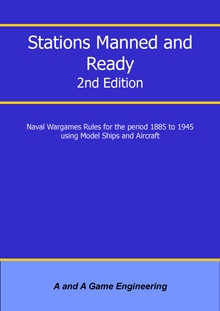
Stations Manned and Ready
These rules are set at a squadron level, allowing relatively large battles to be fought on a normal table in 2 to 4 hours. The period covered by the rules starts in ca. 1885 running through to 1945. The data in the system is compatible throughout so ships from all periods could be matched against each other, though this may not be recommended.
Ship data is presented in sets for nations and time eras. The data sheets are fully prepared for you, so there is no need to fill out separate sheets. The only proviso is that when using smaller vessels you may have print several copies and the names will have to be entered individually by the player. Ships from cruiser upwards all have individual sheets. All data sheets take account of revisions of armament at various times.
Time scales are 6 minutes for a game turn, combat is regulated by the use of 5,000 yard range bands, which provide gun penetration values and torpedo hit modifiers. Armour protection is converted to an armour class on specific areas of the ship, taking account of the armour type and date. Damage represents those hits that cause significant damage to the target, and critical hits cause degradation of the combat effectiveness of ships. Command and crew quality are important and ships are commanded and crewed by men of mixed ability, generated using systems which players will recognise from other A&A titles.
The chance of critical damage is now keyed to the "size of the bang" involved, and the number of guns firing (in the case of ships). More guns means a more chances of causing critical damage, and larger shells/bombs mean a higher chance that critical damage will occur. Higher chances also mean that the damage effects may also be more extensive, because we have expanded the way in which the critical damage system works.
Play follows a sequence using initiative. The winner of initiative chooses which side will move a squadron first. Movement then alternates between the two sides. During Movement the slowest elements finish their movement first, so the order is all submarines, then all ships, finally all aircraft. The winner of initiative then shoots with a squadron first, and then play alternates. Combat actions ignore the type of element involved.
Movement takes into account the manoeuvrability of ships of different sizes. Gunnery takes into account the crew skill of the firing ship, interference by shooting from other vessels, the size of the target and the number of guns firing. Hits will cause structural damage and may also cause critical hits, which will degrade the combat effectiveness of the vessel. As ships get more damaged, there is a possible effect on morale, which may cause formations to withdraw to lick their wounds.
– catalog listing
- Designers
- Andrew Finch, Alan Butler
- Publisher
- A&A Game Engineering
- Status
- In Print
- Contents
- Available online (Wargame Vault) (96-page PDF)
- Scale
Recommended scale: 1/1200 to 1/3000
– catalog listing
Back to RULES DIRECTORY
Areas of Interest19th Century
World War One
World War Two at Sea
Featured Hobby News Article
Featured Link
Featured Showcase Article Whatever happened to the Boogey Men?
Featured Profile Article
Featured Book Review
|
Naval Wargames Rules for the Period 1885 to 1945 using Model Ships and Aircraft
Editions
Current version is second edition.
|

